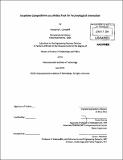Incentive competitions as a policy tool for technological innovation
Author(s)
Campbell, Georgina A. (Georgina Amy)
DownloadFull printable version (32.81Mb)
Other Contributors
Massachusetts Institute of Technology. Technology and Policy Program.
Advisor
Fiona Murray.
Terms of use
Metadata
Show full item recordAbstract
Large incentive competitions are becoming increasingly popular amongst policymakers and philanthropists as a mission-orientated tool for inducing innovation, particularly in areas of national priority where market incentives and conventional tools such as patents and procurements tend not to be sufficient. Using inducement mechanisms (motivators) such as a large financial reward, demanding deliverables, and technical support, incentive competitions seek to motivate innovators to exert effort and develop creative solutions to pre-defined problems. According to the literature, these motivators can be powerful mechanisms for influencing effort and creativity but their effectiveness very much depends on the combination of motivators used and conditions under which they are executed. There is a serious lack of empirical evidence on the motivators and conditions of large incentive competitions and their effectiveness to influence behaviour and outcomes. Therefore, we cannot fully appreciate the role of large incentive competitions in the innovation policy tool kit. A small body of empirical data exists on the impact of motivators within small online prizes but these prizes are very different to large incentive competitions in terms of the intended motivators incorporated and the competition environment. Through qualitative and quantitative analysis of one large incentive competition- the Progressive Automotive XPRIZE (PIAXP), this thesis aims to explore the motivators incorporated into PIAXP and their ability to orient people towards a specified mission and induce innovative behaviour. In turn, this thesis aims to 1) better understand the role incentive prizes as an innovation tool and 2) identify the motivators and prize design that can be used in incentive competitions to promote desired outcomes. My research identifies two unique features of PIAXP, which can provide insight into large incentive competitions in general. 1) PIAXP effectively attracted and focused a diverse set of solvers on a specific problem, who otherwise would not or could not pursue the prize objective(s). For example, 35% of teams did not exist before. Of those teams that did exist, 30% were informal and 17% were non-vehicle- related, all turning to formal vehicle teams for the PIAXP; 2) PIAXP facilitated the development of participating teams and ideas, and actively induced innovative behaviour during the competition. These findings emphasize the important of motivators and prize design to attract and support the development of solvers and solutions. In terms of competition design, participants and organizations were influenced in different ways. Influential motivators included: recognition (validation, publicity, and personal pride), performance accelerators (business and personal), and intrinsic passion for the cause. Other elements of design that influenced entry levels and behaviour included: structure (length/ barriers to entry), categories (broad, specific or multiple), collaborative events, and support (for the organization and individual). Success within PIAXP was positively correlated with compensation and competition but negatively correlated with recognition. Effort was positively correlated with reputation but negatively correlated with fun.
Description
Thesis (S.M. in Technology and Policy)--Massachusetts Institute of Technology, Engineering Systems Division, Technology and Policy Program, 2011. Cataloged from PDF version of thesis. Includes bibliographical references (p. 76-78).
Date issued
2011Department
Massachusetts Institute of Technology. Engineering Systems DivisionPublisher
Massachusetts Institute of Technology
Keywords
Engineering Systems Division., Technology and Policy Program.